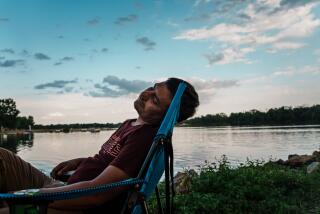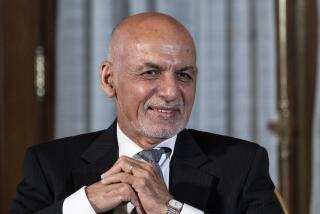Homeland Beckons Afghanistan’s Exiled Monarch
- Share via
OLGIATA, Italy — Mohammad Zaher Shah greets visitors to his suburban villa with a firm handshake and a bold announcement for a man of 87: After nearly three decades in exile, he is coming out of seclusion to plunge into the tumultuous and bloody politics of the Afghanistan he once ruled as king.
His regal bearing, piercing gaze and mental agility during an hourlong interview left little doubt that he feels ready. Set to return home Tuesday to a mammoth public welcome, he said he wishes to live out his days “calming the passions” of his country after its 23 years of civil war.
“Afghanistan is passing through a difficult period of its history because there is no real center of power in the country,” he said, lamenting the proliferation of warlord fiefdoms since Taliban rule collapsed last fall. “The most urgent need is unity among the different [tribal] groups, provinces and ethnic factions.”
Anti-Taliban factions that forged an interim governing council in December have invited Zaher Shah, the country’s most popular elder, to gavel a loya jirga into session June 22. The assembly is to chart a two-year transition to democratic rule and choose a provisional head of state.
But rather than wait for that ceremony, the former monarch said he intends to travel the country and mix with crowds, despite evident security risks. And, for the first time, he made it clear that he would return to the throne if people vote for that, “because nobody should oppose the will of the nation.”
Zaher Shah’s promised activism would be a switch from the reclusiveness of his life in this gated suburb of Rome since a jealous cousin deposed him in 1973 and abolished the monarchy. Compatriots and foreign envoys over the years pleaded for his return to help end a series of Afghan wars that began in 1978, but they often found him aloof and irresolute.
The supplicants came back in droves after Sept. 11, when attacks on America triggered the U.S.-led war that has all but routed the Taliban and its notorious guests, the terrorists of Osama bin Laden’s Al Qaeda network. The ex-monarch received the visitors but, at the behest of Italian authorities, did not venture from his heavily guarded villa until his farewell call last week on President Carlo Azeglio Ciampi.
Two American reporters who passed through the villa’s iron gate late Sunday first had to clear three police checkpoints and a metal detector, undergo a body search and surrender their cell phones. Seated in a simple wooden armchair in his modern four-bedroom home, Zaher Shah complained of feeling “a kind of imprisonment.” He said he would accept no such restrictions in Afghanistan.
“I have a tradition,” he said, recalling his 40-year reign, “that I go around in the country and I mix with the population. There should not be any barriers between me and the people. . . . This close physical contact is something necessary at all costs.”
Afghanistan today is far more unruly than under the constitutional monarchy of Zaher Shah. U.S.-led forces are chasing remnants of Al Qaeda and the Taliban, whose fundamentalist rule gave way to factional struggles among regional and tribal leaders. The new national army is a collection of militias loyal to ethnic Pushtun, Tajik, Uzbek and Hazara warlords, prone to bloody clashes.
Hamid Karzai, the Zaher Shah loyalist who leads the interim government, has failed to halt feuding among his own Pushtuns, the largest ethnic group in Afghanistan. A mob killed one of his ministers last month. The former king, also a Pushtun, is scorned by religious fundamentalists and Tajiks loyal to the pre-Taliban ruler, Burhanuddin Rabbani, who clings to a wing of the former royal palace in Kabul, the capital.
Considering the risks, “it’s going to be a heroic comeback,” said Margherita Boniver, the Italian Foreign Ministry undersecretary who is organizing the journey for Zaher Shah, three of his six children, three grandchildren and three cousins.
They will fly to Kabul on an Italian air force plane, protected by 10 Italian military police officers. The trip was delayed about a week so masons can finish erecting a security wall around the two-story home where they will live. The house was being built for one of his sons when the king was deposed; it was last occupied by a Taliban deputy prime minister.
Zaher Shah professes to be fearless and fatalistic about death. In the interview, he recalled watching the assassination of his father, Mohammad Nadir Khan, by a student during a school celebration in the palace--the regicide that put Zaher Shah on the throne at age 19.
“My father was surrounded by all these people devoted to him, and still a boy pulled out a pistol and shot him in the chest,” he said. “So, whatever the security, if someone is determined, he can manage to hit his target.”
The deposed king said he passed up previous overtures to go home for fear that his presence might aggravate bloody divisions but today is “counting the hours and the minutes” until the trip, convinced that most Afghans will welcome him.
He displayed little emotion about the journey, but aides say he is euphoric. “It’s a totally different kind of enthusiasm from what I saw in him six or eight months ago,” said his spokesman, Hamid Sidig.
That feeling is shared by many Afghans, who are putting up Zaher Shah’s portrait and planning a ceremonial welcome in Kabul that will feature traditional drums and a dance called the atan performed by men in white robes.
People from one province, Paktia, are supplying 500 drums for the occasion and rubbing oil into them, “so it should sound good and loud,” said Zia Mohadedi, a member of Zaher Shah’s staff in Kabul. Pushtun elders in the southern province of Kandahar have invited the ex-king to visit them, saying he’ll be safer there and freer to move about than in Kabul.
“In those historic years that he reigned, those 40 years, Afghans had a wonderful life,” said Abdul Karim Brahoui, the Pushtun governor of Nimruz province. “So he is the best person for the country now.”
“He’s going to be the most significant figure in Afghanistan,” said Selig S. Harrison, an American specialist on South Asia at the Center for International Policy in Washington. “But the question is whether any one person can stabilize the situation.”
Some supporters want Zaher Shah to speak against the continued U.S. campaign on grounds that it is killing civilians and shoring up anti-Taliban warlords who are disloyal to Karzai’s government.
In the interview, the former king refused to join in such criticism. “There are times when action is necessary to eradicate something that is bad in itself,” he said.
As for Karzai’s battered authority, Zaher Shah voiced confidence in the interim leader and quipped that the sartorially conspicuous Karzai’s “international stature is due not only to his cloak.” He welcomed Karzai’s plan to come to Rome and accompany him on the flight to Kabul.
But he added that his own role is to stay above the fray. “It’s a wrong policy to take sides in any quarrel,” the former monarch said.
Petitioners are already lining up. One Pushtun warlord wants Zaher Shah’s backing to rid Paktia of Tajik troops sent by the national army to fight the Taliban. How would his majesty respond?
“Differences in Afghanistan have always existed, but we should not exaggerate by making everything sound as if Pushtuns are fighting Tajiks,” Zaher Shah said. “There are individuals who have contradictory interests, and sometimes they fight. My formula is to use patience, talks, persuasion and, when necessary, force.”
The elderly exile, a tall but stooped figure in an elegant gray suit, was animated and joked dryly during the interview, tiring slightly near the end. He snuffed out a cigar before starting and gestured gently with his right hand, punctuating the soft cadence of his native Dari tongue.
Gen. Abdul Wali--his cousin, son-in-law and former military commander--served as interpreter, corrected at times by two other English-speaking cousins.
Asked about some supporters’ demands that he be lodged in his former palace, Zaher Shah said that the central heating and plumbing don’t work and that a complex of underground passages makes it hard to protect. He laughed at the idea that a building matters.
“I don’t have any special sentiments about that,” he said. “I’m not going to a home or a house. I’m going to my land, even if I live under a tent. It’s my country.”
Times staff writer John Daniszewski in Kabul contributed to this report.
More to Read
Sign up for Essential California
The most important California stories and recommendations in your inbox every morning.
You may occasionally receive promotional content from the Los Angeles Times.













